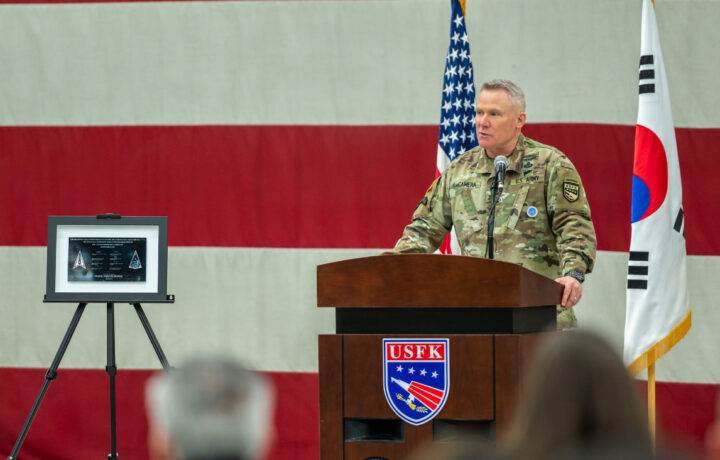The sixth and newest branch of the United States military, the United States Space Force, is responsible for organizing, training, and equipping Guardians to conduct global space operations that enhance the way the military’s joint and coalition forces fight, while also offering decision makers military options to achieve national objectives. Despite that it oversees the domain of space the Guardians, the branch will conduct its operations on terra firma!
A few units will be stationed in South Korea, as this month, the Space Force announced that it has officially activated and assigned U.S. Space Forces – Korea to the U.S. Forces Korea sub-unified command. As the first such facility located in foreign territory, it will enable Washington to better monitor potential adversaries including China, North Korea and even Russia.
It is a significant moment for the Space Force, which was officially launched by then-President Donald Trump three years ago.
Warning to North Korea
The activation of the U.S. Space Forces Korea at Osan Air Base near Seoul followed a recent North Korea missile tests, including a nuclear-capable ballistic missile that was designed to strike the U.S. mainland and its allies.
Lt. Col. Joshua McCullion assumed command of the new SPACEFOR-KOR, a subordinate unit to U.S. Space Forces – Indo-Pacific, at a ceremony held on Dec. 14. It will aid in further synchronizing space operations in the U.S. Indo-Pacific Command area of responsibility, and McCullion described it as the next milestone in strengthening the ironclad commitment to the U.S.-Korean alliance.
“Our U.S. and Republic of Korea alliance was forged more than 70 years ago, as we stood shoulder-to-shoulder in war. With the world around us evolving, so, too, must we,” said McCullion.
The chief of the new space unit also addressed the fact that the Space Force will be headquartered at a U.S. facility just 48 miles south of the heavily fortified border with North Korea.
“The activation here today of U.S. Space Forces Korea, a subcomponent of U.S. Space Forces INDOPACOM, enhances our ability to defend the homelands and ensures peace and security on the Korean peninsula and in Northeast Asia,” added Gen. Paul LaCamera, United Nations Command / Combined Forces Command / United States Forces Korea commander.
Strong U.S. Presence
There are currently some 28,500 U.S. soldiers, sailors, airmen, and marines stationed in South Korea – the United States’ third-largest overseas military presence after Germany and Japan. U.S. Forces Korea (USFK) operates about 90 combat planes, 40 attack helicopters, 50 tanks and some 60 Patriot missile launchers.
Camp Humphreys in Pyeongtaek, just south of Seoul, is the now the largest U.S. overseas military base, and it houses the USFK headquarters along with thousands of troops, civilian workers and their family members. Other major bases in South Korea include Army Garrison Yongsan in central Seoul, Camp Walker in the southeastern city of Daegu, and two air bases in Osan and Gunsan, south of Seoul.
The United States and South Korea have increase their military drills and pushed to bolster their combined defense capability in the face of North Korea’s advancing nuclear program.
It is unclear how many Space Force personnel will be deployed to South Korea, but their arrival will enhance the mission of USFK.
“The U.S. military is faster, better connected, more informed, precise and lethal because of space,” said LaCamera. “Specifically, the activation here today of U.S. Space Forces Korea … enhances our ability to defend the homelands and ensure peace and security on the Korean Peninsula and in Northeast Asia.
When asked how potential adversaries including Beijing and Pyongyang might react to the formation of the unit on the Korean peninsula, Lt. Col MCullion responded that it was his wish that it would have a deterrent effect. “The hope is that they see we are ready.”



